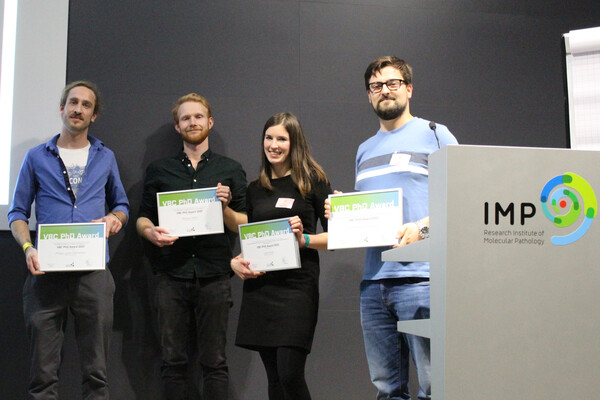2021 VBC PhD Symposium – Meet the VBC PhD Award recipients at IMBA

Michael Mitter, VBC PhD Award 2021 recipient
MM: Thanks Daniel! The main achievement of my project was to create a method that allows researchers to look at the relative structure of replicated DNA. Using this method, we dissected the structure of sister chromatids in different stages of the cell cycle. We focused on the phase just prior to mitosis and found that sister chromatids are not organized randomly but contact each other at specific points.
MM: Absolutely. The key to the specific contact points between sister chromatids is DNA damage repair. The available methods to map the folding of DNA had a serious blind spot prior to our contribution: they were unable to distinguish identical copies of DNA molecules. Our approach to solve this was to label DNA copies in a way such that we can discriminate them by DNA sequencing. With this, my project will have an impact on studying the repair mechanisms of DNA damage. Here, it will become possible to measure how DNA damage on one replicated sister chromatid is repaired using the other as a template, potentially unraveling unforeseen mechanisms.
MM: Definitely! I would summarize my PhD journey as follows:
- “Method development”: the main impact of my project was to visualize a dynamic cellular process using a new tool.
- “Collaboration”: the project could not have been completed without extensive collaboration both on and off campus.
- “Exploratory research”: this project is a showcase of how exploratory research can lead to important insights. We developed a new method that allowed a new view on a process and discovered unexpected patterns through unbiased exploration!
Pablo Hofbauer, VBC PhD Award 2021 recipient
PH: Thanks Daniel! Let me start by saying that one hand does not clap, and that I helped develop cardioids as part of a team in the Mendjan lab at IMBA. In essence, we developed the first such organoid system of the human heart, generating fluid-filled, chamber-like, self-organizing cardiac structures we termed cardioids. Among other things, we were able to show a chamber size defect akin to a human disease called hypoplastic left heart syndrome (small or absent left ventricular chamber). In addition, for the first time as well, we described the beginning of a fibrosis-like response to a myocardial infarction. In simpler terms, this means that modeling heart attack conditions on our cardioids allowed us to observe initial steps of scar tissue formation, i.e., a natural response.
PH: The impact could be quite broad! Let me tell you: cardiovascular disease is the number one cause of death, and the drug pipeline of new drugs is notoriously dry. Hence, the applications could span a broad range. These include using cardioids as a more predictive human model for any number of cardiac diseases for drug discovery. In addition, cardioids could be used as a cardiotoxicity testing platform to test new drug candidates for cardiac safety. More generally, organoids derived from induced pluripotent stem cells have the potential to revolutionize treatment possibilities and the way their effects are evaluated.
PH: Without much hesitation I would say “hard work paying off”, “great support”, and “gratefulness”! The last one is my personal feeling for having had the chance to do what I did at IMBA and the VBC.
On research at IMBA and the VBC
Both awardees highly praise the work environment and life on campus.
Michael underlines all the aspects that led to the success of his project: “The work environment at IMBA/VBC was essential for my project. The extensive collaborations on campus initially led to the idea for the project, enabled its execution and helped with the data analysis at the end. Furthermore, without the Vienna BioCenter Core Facilities (VBCF) – especially the metabolomics and NGS facilities – the initial optimizations and later large-scale experiments would not have been possible.”
Pablo finds prolific words of appreciation for the scientifically vibrant campus life: “The facilities and opportunities offered on campus are great. Moreover, being amidst this fast-paced, interdisciplinary, and high-quality scientific environment made it easy to collaborate, receive feedback and advice, and present my work to experts of various fields. In summary, this unique environment molded me into the scientist I am today!”